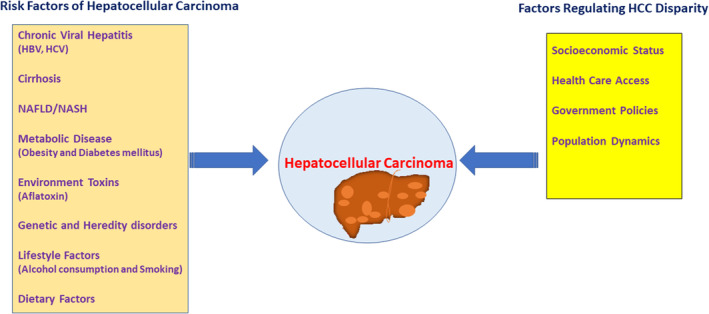Abstract
Despite improved screening and surveillance guidelines, significant race/ethnicity-specific disparities in hepatocellular carcinoma (HCC) continue to exist and disproportionately affect minority and disadvantaged populations. This trend indicates that social determinants and genetic and environmental factors are driving the epidemic at the population level. Race and geography had independent associations with mortality risk among patients with HCC. The present review discusses the risk factors and issues related to disparities in HCC. The underlying etiologies for these disparities are complex and multifactorial. Some of the risk factors for developing HCC include hepatitis B (HBV) and hepatitis C (HCV) viral infection, nonalcoholic fatty liver disease, nonalcoholic steatohepatitis, smoking, and alcohol consumption. In addition, population genetics; socioeconomic and health care access; treatment and prevention differences; and genetic, behavioral, and biological influences can contribute to HCC. Acculturation of ethnic minorities, insurance status, and access to health care may further contribute to the observed disparities in HCC. By increasing awareness, better modalities for screening and surveillance, improving access to health care and adapting targeted preventive and therapeutic interventions, disparities in HCC outcomes can be reduced or eliminated.
hepatocellular carcinoma Keywords:
alcohol intake; diabetes; ethnic disparities; hepatitis B (HBV) infection; hepatitis C (HCV) infection; hepatocellular carcinoma; metabolic syndrome; nonalcoholic fatty liver disease; obesity; smoking.
© 2020 The Authors. JGH Open: An open access journal of gastroenterology and hepatology published by Journal of Gastroenterology and Hepatology Foundation and John Wiley & Sons Australia, Ltd.
